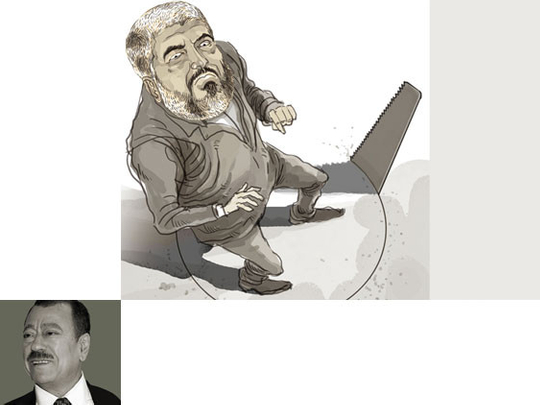
Hamas finds itself increasingly divided over the Syrian crisis, leading many to question whether the organisation can continue, in its present state of turmoil, to perform the function for which it was established — to resist the Israeli occupation of Palestine.
Having enjoyed the financial and material support of Syria — along with Iran and Hezbollah — for at least 20 years, Hamas leader Khalid Mesha’al prematurely jumped ship when he uprooted the group’s politburo from Damascus in January 2012 and moved it to Doha. Since Qatar is a leading light in the so-called ‘Axis of Moderation’, and one of the main financiers of the Syrian opposition, the move clearly indicated a transfer of loyalties.
Mesha’al, who was re-elected for a fifth term as head of the Hamas Politburo in April, had miscalculated, assuming that Syrian President Bashar Al Assad would be toppled as swiftly as his counterparts in Tunisia, Egypt and Libya. He also alienated Hamas’s former ‘Axis of Resistance’ allies, Iran and Hezbollah.
Matters came to a fiery head following the battle of Qusayr earlier this month in which opposition forces were defeated by the Syrian Army, aided by Hezbollah fighters. In the ruins of that unfortunate city, Hezbollah men discovered that the opposition had been in possession of landmines which Hezbollah itself had supplied to Hamas.
In addition, the rebels (a mixture of jihadi groups and Free Syria Army fighters) had dug extensive tunnel systems under Qusayr using technological know-how which Hamas had formerly acquired from Hezbollah. The implications were clear, and Hezbollah now accused Hamas of offering material support to the rebels, thereby being indirectly responsible for the deaths of hundreds of Hezbollah fighters.
As the sectarian aspect of the Syrian civil war has intensified and extended beyond Syria’s borders, there is a logic in Sunni Hamas feeling uncomfortable about siding with the Shiite (Alawite) regime, backed by Shiite Iran and Shiite Hezbollah. And that is Mesha’al’s rationale.
Two days ago, Mesha’al ramped up his stance on Syria when, during a visit to Egypt, he overtly set himself against Hezbollah, urging them to leave Syria and concentrate on resistance against Israel instead — advice the more radical wings of Hamas would like Mesha’al himself to heed.
Hamas’s military wing — the Izz Ad-Deen Al Qasam Brigades — and another wing, led by Mahmoud Al Zahar, were quick to point out that the ‘moderate’ Arab countries have done little to help the Palestinian cause, whereas Hezbollah has long been an important ally, not only resisting Israel itself, but training Hamas fighters and smuggling arms into Gaza from Iran (and formerly, Syria) via Sudan.
Mesha’al’s move into the Sunni camp, led by Qatar, Turkey and Saudi Arabia, not only cuts off its source of funding and arms for the past 20 years (Iran) but also places Hamas in the unprecedented, and mutually uncomfortable, situation of sharing the same trench as America.
Paradoxically, Hamas’s rival, Fatah, led by Palestinian National Authority President Mahmoud Abbas, is also in the US-led camp; Fatah will not hesitate to make political capital out of Hamas’s internal struggles and apparent loss of direction.
It is no coincidence that Mesha’al made his most ferocious criticisms of Hezbollah during his recent visit to Cairo, Hamas having emerged as an offshoot of the Muslim Brotherhood. When I met Egyptian President Mohammad Mursi two weeks ago, he was very measured on Syria and favoured a negotiated settlement.
This week, however, he performed a spectacular U-turn, announcing his support for a fatwa — issued by a group of Sunni scholars, headed by Yousuf Al Qaradawi — calling for jihad against Al Assad.
Mesha’al was in Cairo when Mursi cut diplomatic ties with Al Assad’s regime on June 15 and called on Hezbollah to withdraw from Syria; the next day, Mesha’al followed suit, paradoxically accusing Hezbollah of inciting sectarianism, and effectively ending Hamas’s relationship with the Shiite alliance.
This could be another miscalculation. The Muslim Brotherhood’s grip on power in Egypt is tenuous, with millions expected to march against Mursi on June 30, first anniversary of his presidency. The Rafah crossing into Gaza is controlled by the Egyptian Army and Security Services who have it in their power to suffocate Hamas.
In addition, Saudi Arabia and the UAE are overtly hostile to the Muslim Brotherhood. If Mursi falls, Hamas risks almost total isolation, with Qatar its only remaining friend.
In contrast to Mesha’al’s approach, Palestinian Islamic Jihad’s leader, Ramadan Abdullah Mohammad Shallah (who was also based in Damascus), left Syria without fanfare and has discreetly maintained contact with both Iran and Hezbollah, moving freely between Doha, Cairo and Tehran.
Mesha’al, his critics say, could have done the same had he not allowed himself to be side-tracked into Arab politics and sectarianism to the detriment of Hamas.
Indeed, there was a wasted opportunity here. Instead of widening the sectarian faultline, Hamas could have bridged it, reminding all Muslims, Sunni and Shiite, that justice and freedom for Palestine are goals we all share.
Abdel Bari Atwan is editor of the pan-Arab newspaper Al Quds Al Arabi. His latest book is After Bin Laden: Al Qaida, the Next Generation.








